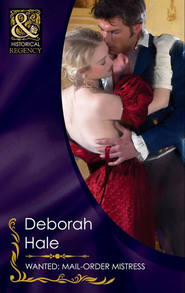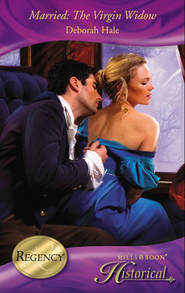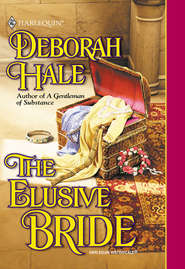По всем вопросам обращайтесь на: info@litportal.ru
(©) 2003-2024.
✖
The Wedding Wager
Настройки чтения
Размер шрифта
Высота строк
Поля
Or so he told himself.
“Give the ivories another rattle, Sergeant?” A young corporal from Morse’s regiment flashed a hopeful grin. The lad’s right arm had been severed below the elbow, but he’d learned to throw the dice pretty well with his left hand.
Morse shook his head in the manner of an elder brother who had better occupations than entertaining the little ones in the family. “You heard Matron, Corporal Boyer. No gambling on hospital property. I’m in hot water enough with the army. No need to go courting more.”
Boyer flashed him an awkward grin, then ambled off. This was the first time Morse had referred to the Board of Inquiry, though the matter must have been common knowledge among the convalescing soldiers at Bramleigh.
There was a good chance he would end up cashiered. Dismissed from the army in disgrace. Thinking of the Board made Morse think of the miserable retreat from Bucaso. His leg throbbed, just above the knee, where a French bayonet had pierced it.
During the British retreat from Bucaso.
Limping over to his cot, he sank down on it, stretching out his long frame. His heels projected two inches past the end of the thin mattress. To distract himself from the pain in his leg and the equally painful memories of that last rearguard skirmish, Morse turned his thoughts to Leonora Freemantle.
The gall of the woman! To stroll in like Lady Bountiful with her Christmas basket and offer to turn him into a gentleman. In the instant before she’d opened her mouth, something about her had attracted him. Now Morse was damned if he could decide what it might have been.
She had little in common with the type of woman he usually favored. In the first place, her figure was too lean and angular for his taste. He seldom paid much heed to women’s clothes, but in her case they were too ugly to ignore. He often noticed women’s hair, but Miss Freemantle had kept hers pulled back so severely and covered by her bonnet that he could not have sworn as to its color. There might have been something to her eyes—color or clarity, but tight little spectacles detracted from their modest charms.
Altogether a prim, bluestocking spinster.
None of these had roused Morse’s antagonism, though. Her voice had done that.
Since joining the army, during his service in India and Spain, he’d seldom had occasion to hear an English lady speak. There was only one female at the Bramleigh hospital—if you could call her that. Matron, the old gargoyle, spoke in Cornish dialect so broad Morse often had trouble understanding her. Nothing in her gravelly voice evoked painful memories. Morse could not say the same for Leonora Freemantle.
To make matters worse, her first words to him had concerned a proposition. True, it was not the kind of proposition Lady Pamela Granville had made him on the day before he enlisted. The emotional echo stung just the same. It had made him resist Miss Freemantle’s offer even before he heard it. Now, as his leg throbbed and he tried to block out the persistent din of the ward, Morse wondered if he’d been a fool to reject her proposal out-of-hand.
His other options were depressingly limited. He couldn’t stay on at Bramleigh much longer, since he was past danger of amputation and he could use the leg, however haltingly. Even if the Board of Inquiry didn’t drum him out of the service, he could not go back to soldiering. The doctors were optimistic that his mobility would return with time. Until then, his lameness would make it all but impossible to find the sort of job his limited education had equipped him for.
The dinner bell rang. With a weary sigh, Morse hauled himself up from his cot and joined the tail end of the queue headed for the refectory. There, he spooned the tepid, watery stew into his mouth with little interest or enjoyment. Boyer and a few of the other lads from his regiment took their places with Morse at their accustomed table. In one way or another, they were all casualties of the retreat from Bucaso.
They were the lucky ones.
“Yer comp’ny didn’t stay long, Sergeant.” There was an implied question in Boyer’s innocent remark. “Not exactly your kinda woman, were she?”
The men exchanged grins all around the table. Their sergeant’s way with women was a point of pride among his men. They knew he had a taste for pretty, plump, saucy barmaids. They also knew he seldom had trouble attracting them.
Without glancing up from his stew, Morse cut their amusement short with a single muttered sentence. “The lady was Lieutenant Peverill’s cousin.”
A muted “Oh” rose from the men, breathed with obvious regret and perhaps a little shame. The late Lieutenant Wesley Peverill had enjoyed universal esteem among the enlisted men in his company. None more than his sergeant—Morse Archer.
Just then, Morse realized what had drawn him to Miss Freemantle in the instant before she spoke. It was the likeness to her cousin. Lieutenant Peverill had been a short, slight man with a deceptive air of delicacy. Yet that unpromising frame had housed the guile of a serpent, the tenacity of a badger and the courage of a lion. For as long as he lived, Morse Archer would rue his young lieutenant’s senseless death.
He had glimpsed something of Lieutenant Peverill’s cleverness and ferocious bravery in the woman. She had stood her ground and peppered him with every scrap of ammunition she could muster. When he’d turned on her with the full force of his wrath, she had scarcely flinched. He’d been skeptical of her claim that social class meant nothing to her. Now, remembering her kinship to the lieutenant, he could believe it.
Boyer spoke up again. “Came to thank ye, did she, Sergeant?”
Morse nodded. “Something like that.”
The men knew Sir Hugo Peverill had called on their sergeant soon after they’d all arrived at Bramleigh. The old man had come to thank Morse for risking his life to rescue the lieutenant from certain death. Unfortunately, the young man’s wounds had proven too grave to survive. But his heartbroken father had cherished the small consolation that the lad had died and been buried at his home in England rather than some shallow, unmarked grave in Portugal.
Sir Hugo had offered Morse money, a job, anything he might ask. Morse had declined with rather ill grace. He took no pride in his actions during the retreat. His desperate charge into a forest of French bayonets had been too little, too late. To accept a reward for it only compounded his sense of guilt.
Apparently the wily old Sir Hugo was unwilling to take no for an answer. Thus the transparent stratagem of this wager with his niece. Morse did not go so far as to suspect Leonora Freemantle knew it was a ruse. She could not have entreated him so passionately unless she believed it to be genuine.
Gnawing on a crust of hard bread, Morse imagined the food he might have received at Sir Hugo’s estate, Laurel-wood. When rations had been tight in Portugal, Lieutenant Peverill had often waxed lyrical about the contents of his father’s larder and the talent of his kitchen staff. More such stories recurred to Morse as he lolled around the ward after dinner feeling curiously restless.
That night he dreamed of a fine, fat feather bed made up with linen that smelled of sunshine and clover. A warm, cheery fire blazing in the hearth. A plump roast goose laid out on the sideboard with all the trimmings, its skin brown and crisp over juicy dark meat. Morse woke to find his mouth watering.
No doubt about it, Laurelwood would have made a soft billet for the next three months, while he recovered the full use of his leg. A snug roof over his head. Meals the like of which he hadn’t eaten in years. And nothing required of him but to suffer the tutelage of Sir Hugo’s bluestocking niece. For a wonder, the idea rather appealed to him.
It was too late now, though.
No doubt Miss Freemantle had gone straight out and acquired a more willing subject. A sharp fellow who didn’t let pride and foolish memories blind him to a good thing.
Morse recalled his father’s gruff admonition. “When a man’s got nothing, he can’t afford pride, son.”
He also remembered the bitter elegy he’d muttered over the unmarked graves of his family. “When a man’s got nothing, pride’s all he can afford.”
One of these days, Morse Archer decided with a rueful shake of his head, his misbegotten pride was going to land him in serious trouble.
Chapter Two
“Dash it all, Leonora. Don’t keep me in suspense any longer, my dear.” Sir Hugo Peverill glanced up from his eager ingestion of the roast goose, an expectant gleam in his eye. “How soon can he come?”
To delay her reply, Leonora pretended an intense concentration on her dinner. She was hungry. It had been a long, cold ride to Bramleigh and back, with only her indignation to keep her warm on the return journey.
“Well? How soon?” repeated Sir Hugo.
Still, Leonora hesitated to speak the words. She was no coward. Cousin Wesley had often claimed she possessed more courage than a field officer—denying society’s expectations by remaining unwed and devoted to her scholarly pursuits.
It was one thing to deny society. Quite another to deny Sir Hugo when he took hold of an idea. Leonora often compared her late aunt’s husband to a Royal Mail coach. Thundering toward his destination. Waving away objections like the Royal Mail speeding through toll stations. Impatient of the slightest delay or detour.
He wouldn’t be happy with the detour she was about to deliver him. No sense in forestalling the inevitable, however.
“He isn’t coming, Uncle.” Though she tried to sound indifferent, Leonora braced for the backlash. “We’ll simply have to find someone else. I’m certain there are plenty of men with the sense to recognize a unique opportunity when they’re presented with one.”
“Not coming? Ridiculous. Rot!” Sir Hugo’s white side-whiskers bristled aggressively and his prominent Roman nose cleaved the air. “Of course he’s coming.”
Leonora almost expected him to add, Sergeant Archer just doesn’t know it yet.
She shook her head. “No, Uncle. He was quite adamant on the point. I had a devil of a time even persuading him to give me a hearing. When I finally won the opportunity to state my business, he accused me of trying to cram charity down his throat.”
“Then you must’ve gone about it all the wrong way.” Eerily pale blue eyes shone with a glacial light that terrified many people. “Knew I should’ve gone with you. You’re a fine filly, Leonora, but you don’t reckon with the importance of a man’s pride.”
Leonora pushed her plate away. Her stomach suddenly felt sour. She longed to remind Sir Hugo that she’d seen her family’s fortune decimated, all in the name of assuaging male pride. Noting how the ruddy flesh of his jowls had taken on a deep mulberry cast, she refrained from engaging him in a full-scale argument.
For all his overbearing will and eccentric whims, he was a warmhearted, generous creature. With only a tenuous claim of kinship by marriage, he had been more of a father to her than any of the men her mother had married.
“Don’t get yourself into a state, Uncle.” She did her best to soothe him. “Can’t we just find someone else? I don’t believe Sergeant Archer will do it no matter who asks or how we coax him. He’s an impossibly stubborn fellow.”











